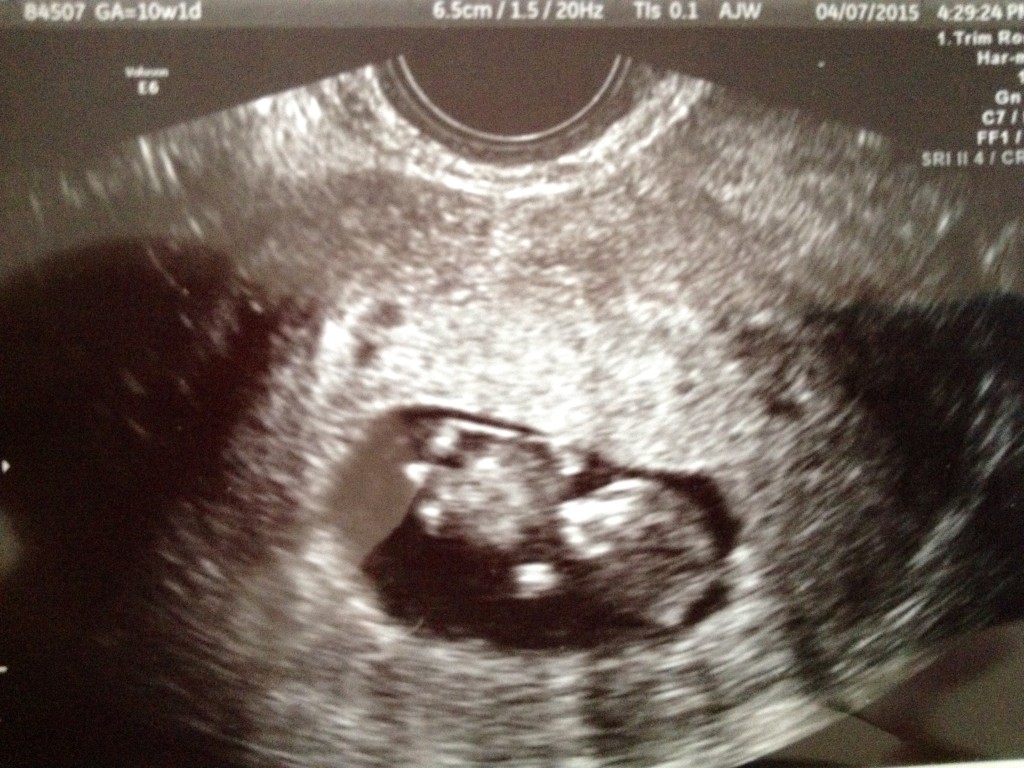 I’m just months away from turning 40. I’m also pregnant.
I’m just months away from turning 40. I’m also pregnant.
Yesterday, we had an ultrasound, and we got to see our new little booger kicking and waving and being busy on the sonogram screen, clearly alive and vibrant and shaped like a mini human at only ten weeks’ gestation – that’s a real photo of him or her above.
I also had blood drawn yesterday for a relatively new genetic screening test called the MaterniT 21. It’s so new, in fact, that there’s only one lab in the country that runs the test. How does it work, you ask? Well, as I understand it, by ten weeks the placenta begins to shed some cells, and those cells, which enter the mother’s bloodstream, contain enough of the baby’s DNA to identify the possibility of genetic abnormalities, including things like the presence of trisomies, which are instances where there are three of a chromosome instead of two. Down Syndrome, for example, is also known as Trisomy 21, because it is the occurrence of three of the 21st chromosome. You just learned a lot more than you bargained for, didn’t you?
My age puts me in the “high risk” category, which is why I was eligible for the MaterniT 21. Now, I don’t feel high risk. My womb seems to be rock solid (not surprising considering my own genes, which include a maternal grandmother who gave birth fourteen times without a hitch). There’s not even a faint sign of an issue of any kind. At the same time, I know that statistically, we have a higher risk of having a child with a genetic abnormality because of my age. And you know what? I’m okay with that. God saw fit to let us get pregnant, so I figure He is in charge of this baby, which is really His anyway.
But my decision to undergo genetic screening seems to be confusing for people, especially for other Christians. The M.O. of Christians seems to be “I wouldn’t terminate, so there’s no point in being tested,” as though termination is the only thing to think about. So I want to explain, not because I feel the need to defend myself, but because if you are one of those confused people, I want you to see things from another angle, so that you can think about how you respond in the future to someone else who has decided to undergo genetic screening during pregnancy.
First, the answer to your question is no. No, we would never terminate.
So why find out if there’s a possibility of genetic abnormality? If we wouldn’t terminate, what’s the point?
One word: preparation.
I loved what my doctor said to me about the MaterniT 21. She said, “You are in great shape, and I don’t personally see any reason to be concerned about risks. But at the same time, insurance covers this test for you because you qualify as high risk, so why not take advantage of it? It’s not about termination; it’s about information.”
I know myself. I know that I’m a researcher. I know that I’m an external processor. I know that I’m a planner. If I were to have a baby with special needs, I would rather not be blindsided in the delivery room. I would rather have time to pray, to think, to talk over my feelings with my husband and my closest friends, to do my homework. Time to wrap my mind and heart around whatever is coming. Time to rail at God. Time to surrender my anger. Time to grieve. And time to ultimately embrace God’s will for the future.
Not everyone is like me. My sister-in-law, who is raising a child with Noonan Syndrome, another kind of genetic abnormality, asserts that even now, she wouldn’t want to go back and find out during her pregnancy. She says she would have fretted too much. Remembering the initial weeks of my nephew’s life, when everything was a huge question mark because the doctors didn’t consider genetic testing right away, I know I am wired differently. I wouldn’t want to go through that. On the other hand, I can live with the fact that all genetic screens come with the possibility of a false positive result (although apparently, the MaterniT 21 has the lowest possibility of any test out there).
We are all different in how we process and cope. And that is okay. I suppose that’s what I’m getting at: all parents have the right to feel how they feel, decide what they decide, process how they process without anyone questioning them.
For some reason, we as a culture seem to think that we have a right to express our unsolicited opinions on pregnancy-related decisions to expectant parents. And we just don’t. We just don’t.
So confused people, especially you hard-core conservatives who [mistakenly] think that genetic screening is always and only about the termination question, please reconsider your thoughts and your words, and about freely offering your opinion to expectant parents. Don’t make assumptions about the intentions of an expectant parent. Step back and sweep the politics off the table. Genetic screening is not, in and of itself, an evil. For some, it can be a saving grace. A foundation. A starting point on a journey.
And expectant parents, let me just say: you can tell people to back off. You can politely say, “Thank you for your opinion,” and walk away. You owe no one an explanation. It’s your baby, your family, your peace of mind. You have permission to be be who you are, to deal how you deal best.
Blessings,
Harmony

Harmony – You are so kind and gracious! Everything you have said is true and very sweetly expressed, and I agree with you 100%! I often wonder: if believers spent as much time praying and educating themselves over an issue as they do expressing opinions about it, how much different would our world be? I know this…we’d be quicker to serve as band-aids instead of swords. We’d be more adept at offering compassion rather than judgement. And we’d most certainly come alongside the hurting just for the purpose of being Jesus to them instead of trying to ‘set them straight.’ Thank you for a most insightful and beautifully worded testimony!
Thank you, dear Marilyn! I am so blessed by your words!